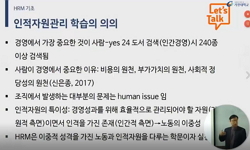본 연구는 직무수행 평가의 정확성을 위한 평가자 훈련 중 참조틀 훈련(FOR)과 변산성 훈련(RVT)의 영향을 비교하고, 평가자의 책임성 지각과 평가자 기분(mood)의 상호작용 효과를 검증하였다. ...
http://chineseinput.net/에서 pinyin(병음)방식으로 중국어를 변환할 수 있습니다.
변환된 중국어를 복사하여 사용하시면 됩니다.
- 中文 을 입력하시려면 zhongwen을 입력하시고 space를누르시면됩니다.
- 北京 을 입력하시려면 beijing을 입력하시고 space를 누르시면 됩니다.

평가정확성에 대한 평가자 훈련 유형의 영향: 책임성과 평가자 기분(mood)의 상호작용 효과 = The Effect of Rater Training Type on Rating Accuracy: Focusing on Interaction Effect of Accountability and Rater Mood
한글로보기https://www.riss.kr/link?id=A103752127
- 저자
- 발행기관
- 학술지명
- 권호사항
-
발행연도
2008
-
작성언어
Korean
- 주제어
-
등재정보
KCI등재
-
자료형태
학술저널
- 발행기관 URL
-
수록면
745-768(24쪽)
-
KCI 피인용횟수
2
- DOI식별코드
- 제공처
- 소장기관
-
0
상세조회 -
0
다운로드
부가정보
국문 초록 (Abstract)
본 연구는 직무수행 평가의 정확성을 위한 평가자 훈련 중 참조틀 훈련(FOR)과 변산성 훈련(RVT)의 영향을 비교하고, 평가자의 책임성 지각과 평가자 기분(mood)의 상호작용 효과를 검증하였다. 세부적으로, 평가자 훈련이 Cronbach(1955)가 개념화 한 전반적 정확성(EL), 대상 정확성(DE), 차원 정확성(SA), 대상내 차원 정확성(DA) 등 4가지 평가 정확성 구성요소에 미치는 효과를 비교하고, 책임성이 부여된 집단과 그렇지 않은 집단 및 긍정기분 집단과 부정기분 집단의 평가 정확성 차이를 비교하였다. 또한, 이 세 변인의 삼원상호작용 효과를 연구하였다. 146명의 대학생을 대상으로 강의평가 맥락에서 평가자 훈련×책임성×기분의 2×2×2 실험 설계를 통한 연구를 실시하였다. 연구 결과, 피평가자간 변별성을 증가시키는 변산성 훈련 집단이 참조틀 훈련 집단에 비해 DE에 대한 정확성 향상이 높은 것으로 나타났다. 하지만 다른 평가 정확성 요소에 대하여 두 훈련 유형의 차이는 유의하지 않았다. 책임성과 평가자 기분의 상호작용은 EL에서 나타났으며, 책임성이 부여된 집단은 긍정기분 집단이 더 정확하게 평가를 하였고, 책임성이 부여되지 않은 집단은 부정기분 집단이 더 정확하게 평가를 하였다. 하지만 다른 평가 정확성 요소에 대한 효과는 유의하지 않았다. 평가자 훈련과 책임성, 평가자 기분의 삼원상호작용도 유의하지 않았다. 이와 같은 결과를 바탕으로 평가 맥락에서 평가자 훈련 유형과 책임성, 평가자 기분의 영향을 논의하였다.
참고문헌 (Reference)
1 한태영, "청소년의 정서관련 변인과 학업 스트레스의 관계: 체험정서, 표현정서, 및 정서지능의 영향" 한국심리학회지 2 (2): 37-58, 2005
2 이주일, "조직 장면에서 체험된 정서와 표현된 정서간 불일치의 효과: 경쟁가설의 검증" 한국심리학회지 12 (12): 171-193, 1999
3 한국경제, "인사고과 시즌, 흔히 볼 수 있는 평가자 유형 1위 ‘내 사람 챙기기형’. 8월 23일자"
4 Murphy, K. R., "Understanding performance appraisal: Social, organization, and goal-based perspectives" Sage publications. 1995
5 Hauenstein,N.M.A., "Training raters to increase the accuracy of appraisals and the usefulness of feedback. In Performance Appraisal" Jossey Bass San Francisco 404-442, 1998
6 Schlenker, B. R., "The self and social life" McGraw-Hill 1985
7 Lerkowitz, J., "The role of interpersonal affective regard in supervisory performance ratings: A literature review and proposed causal model" 73 : 67-85, 2000
8 McAllister, D. W., "The contingency model for the selection of decision strategies: An empirical test of the effects of significance, accountability, and reversibility" 24 : 228-244, 1979
9 Bernardin, H. J., "Strategies in rater training" 6 : 205-212, 1981
10 Hauenstein, N. M. A., "Rater variability training: An alternative procedure to rater error training and frame-of-reference training. Unpublished Manuscript" Virginia Polytechnic Institute and State University, Blacksburg 1999
1 한태영, "청소년의 정서관련 변인과 학업 스트레스의 관계: 체험정서, 표현정서, 및 정서지능의 영향" 한국심리학회지 2 (2): 37-58, 2005
2 이주일, "조직 장면에서 체험된 정서와 표현된 정서간 불일치의 효과: 경쟁가설의 검증" 한국심리학회지 12 (12): 171-193, 1999
3 한국경제, "인사고과 시즌, 흔히 볼 수 있는 평가자 유형 1위 ‘내 사람 챙기기형’. 8월 23일자"
4 Murphy, K. R., "Understanding performance appraisal: Social, organization, and goal-based perspectives" Sage publications. 1995
5 Hauenstein,N.M.A., "Training raters to increase the accuracy of appraisals and the usefulness of feedback. In Performance Appraisal" Jossey Bass San Francisco 404-442, 1998
6 Schlenker, B. R., "The self and social life" McGraw-Hill 1985
7 Lerkowitz, J., "The role of interpersonal affective regard in supervisory performance ratings: A literature review and proposed causal model" 73 : 67-85, 2000
8 McAllister, D. W., "The contingency model for the selection of decision strategies: An empirical test of the effects of significance, accountability, and reversibility" 24 : 228-244, 1979
9 Bernardin, H. J., "Strategies in rater training" 6 : 205-212, 1981
10 Hauenstein, N. M. A., "Rater variability training: An alternative procedure to rater error training and frame-of-reference training. Unpublished Manuscript" Virginia Polytechnic Institute and State University, Blacksburg 1999
11 Harris, M. M., "Rater motivation in the performance appraisal context: A theoretical framework" 20 : 737-756, 1994
12 Murphy, K. R., "Rater errors and rating accuracy" 71 : 39-44, 1986
13 Woehr, D. J., "Rater Training for Performance Appraisal: A Quantitative Review" 67 : 189-205, 1994
14 Stamoulis. D. T., "Rater Training and Ratting Accuracy: Training for Dimensional Accuracy Versus Training for Ratee Differentiation" 78 : 994-1003, 1993
15 Izard, C. E., "Psychology of emotions" Plenum 1991
16 Cronbach, L. J., "Processes affecting scores on “understanding of others” and “assumed similarity" 52 : 177-193, 1955
17 Ferris, G. R., "Personnel /human resources management: A political influence perspective" 17 : 447-488, 1991
18 Srull, T. K., "Person memory and judgment" 96 : 58-83, 1989
19 Landy, F. J., "Performance rating" 87 : 72-107, 1980
20 Carroll, S. J., "Performance appraisals and revel systems: The identification. measurement. and development of performance in organizations" Scott. Foresman. 1982
21 Cardy, R. L., "Performance Appraisal: Alternate Perspectives" South-Western Publishing. 1994
22 Schwarz, N., "Mood, misattribution, and judgments of wellbeing: Informative and directive functions of affective states" 45 : 513-523, 1983
23 Sinclair, R. C., "Mood, categorization breadth. and performance appraisal: The effects of information acquisition and acquisition and affective state on halo, accuracy, information retrieval, and evaluations" 42 : 22-26, 1998
24 Bless, H., "Mood and persuasion: A cognitive response analysis" 16 : 331-345, 1990
25 Robbins, T. L., "Mood VS.Interpersonal Affect: Identifying Process and Rating Distortions in Performance Appraisal" 12 : 313-325, 1998
26 Forgas, J. P., "Mood Effects on Person -Perceptron Judgments" 53 : 53-60, 1987
27 Latham, G. P., "Job performance and appraisal In International Review of Industrial and Organizational Psychology," Wiley 1986
28 DeNisi,A., "Implications for theory and practice, In Cognitive approach to performance appraisal" NY 151-172, 1996
29 Schwarz, N., "How do I feel about it? The informative function of affective states. In Affect, cognition, and social behavior" Hogrefe. 44-62, 1988
30 Bodenhausen, G. V., "Happiness and stereotypic thinking in social judgment" 66 : 621-632, 1994
31 Kemter, v., "Frame-of-reference training: Evaluation of rating accuracy within a double-pretest-one- posttest-design" 1 : 1-31, 2007
32 Sulsky, L. M., "Frame -of-reference training and cognitive?categories: Am empirical investigation of rater memory issue" 77 : 501-510, 1992
33 Schwarz, N., "Feelings as information: Moods influence judgments and processing strategies. In Heuristics and biases: The psychology of intuitive judgment" Cambridge University Press. 534-547, 2002
34 Lazarus,R.S., "Emotion and Adaptation" Oxford University Press. 1991
35 Bernardin, H. J., "Effects of rater training: New response sets and decreasing accuracy" 65 : 60-66, 1980
36 Sinclair, A. L., "Differentiating Rater Accuracy Training Programs. Thesis?submitted to the Faculty of the Virginia Polytechnic Institute and State University in partial fulfillment of the requirement for the degree of Master of Science in Industrial" Organizational Psychology 2000
37 Feldman, J. M., "Beyond attribution theory: a perceptual -cognitive viewpoint. In Personal and Human Resource Management, 4" JAI Press. 1981
38 Hauenstein, N. M. A., "An information -processing approach to leniency in performance judgments" 77 : 485-493, 1992
39 Mero, N. P., "Accountability in a Performance Appraisal Context: The Effect of Audience and Form of Accounting on Rater Response and Behavior" 33 : 223-252, 2007
40 Palmer. J. K., "Accountability and Need for Cognition Effects on Contrast, Halo, and Accuracy in Performance Ratings" 139 : 119-138, 2005
41 Pulakos, E. D., "A comparison of training programs: Error training and accuracy training" 69 : 581-588, 1984
동일학술지(권/호) 다른 논문
-
상사-비서 교환관계, 조직 동일시, 조직 기반 자기 존중감 간 관계
- 한국산업및조직심리학회
- 황정희
- 2008
- KCI등재
-
대졸 미취업자들의 정신건강 변화에서의 진로 정체감 효과: 비선형 다층모형의 적용
- 한국산업및조직심리학회
- 이지영
- 2008
- KCI등재
-
관계적 리더십과 팀 구성원의 성과: 리더-구성원 교환관계(LMX)와 사회적 네트워크 관점의 통합
- 한국산업및조직심리학회
- 이기현
- 2008
- KCI등재
-
직무만족과 개인-직무 부합도가 청년근로자의 이직 결정에 미치는 영향: 사건사 분석법의 적용
- 한국산업및조직심리학회
- 이선희
- 2008
- KCI등재
분석정보
인용정보 인용지수 설명보기
학술지 이력
| 연월일 | 이력구분 | 이력상세 | 등재구분 |
|---|---|---|---|
| 2022 | 평가예정 | 재인증평가 신청대상 (재인증) | |
| 2019-04-17 | 학회명변경 | 영문명 : Korea Society for Industrial and Organizational Psychology -> Korean Society for Industrial and Organizational Psychology |  |
| 2019-01-01 | 평가 | 등재학술지 선정 (계속평가) |  |
| 2018-12-01 | 평가 | 등재후보로 하락 (계속평가) |  |
| 2018-02-15 | 학술지명변경 | 외국어명 : The Korean Journal of Industrial and Organizational Psychology -> Korean Journal of Industrial and Organizational Psychology |  |
| 2017-02-27 | 학회명변경 | 영문명 : 미등록 -> Korea Society for Industrial and Organizational Psychology |  |
| 2015-01-01 | 평가 | 등재학술지 유지 (등재유지) |  |
| 2011-01-01 | 평가 | 등재학술지 유지 (등재유지) |  |
| 2009-01-01 | 평가 | 등재학술지 유지 (등재유지) |  |
| 2007-01-01 | 평가 | 등재학술지 유지 (등재유지) |  |
| 2005-01-01 | 평가 | 등재학술지 유지 (등재유지) |  |
| 2002-01-01 | 평가 | 등재학술지 선정 (등재후보2차) |  |
| 1999-07-01 | 평가 | 등재후보학술지 선정 (신규평가) |  |
학술지 인용정보
| 기준연도 | WOS-KCI 통합IF(2년) | KCIF(2년) | KCIF(3년) |
|---|---|---|---|
| 2016 | 1.75 | 1.75 | 1.81 |
| KCIF(4년) | KCIF(5년) | 중심성지수(3년) | 즉시성지수 |
| 1.93 | 2.09 | 3.578 | 0.28 |





 KCI
KCI






